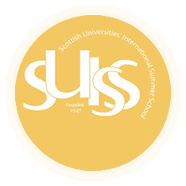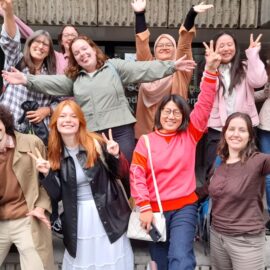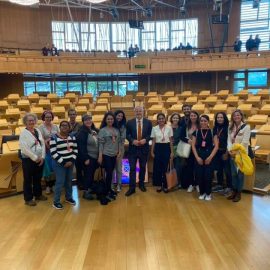Thanks to the generous support of Creative Scotland, we were able to welcome Clara Ministral and Maria Pelleta, two talented translators, to our Contemporary and Scottish Literature courses this summer. As in previous years, a key component of the Fellowship is for our translators to deliver presentations on their practice as part of our Translation Showcase event, which takes place in August. This year the event took place at the University of Edinburgh, and we’re very pleased to be able to share Clara’s and Maria’s presentations here for those that missed the event. We hope you find their presentations as illuminating and entertaining as we at SUISS did, with our thanks again to Clara and Maria for sharing their enthusiasm and passion for translation in all its forms.
Clara says:
As a professional literary translator, it was incredibly useful to be granted a more
academic insight into the literary world than the one I might be more typically afforded.
In my experience, that domain can prove somewhat inaccessible to translators so it is
always professionally valuable when these kind of infrequent bridging opportunities
emerge.
Meeting other attending translators (including, of course, my ‘fellow Fellow’
María Pelletta) facilitated much rich conversation, and their diverse backgrounds were
often stimuli to reflective discussion which will surely benefit my professional practice in
due course. In fact, it would be remiss of me to limit my observations solely to the
translators who were present, as so many of the other attendees, tutors and lecturers
were fascinating individuals who really helped generate an enriching and intellectually
curious atmosphere.
Although both courses were great, I especially enjoyed the Scottish Literature one, which
was a fantastic way for me to deepen my rather limited knowledge of Scottish writing. I
feel the course has offered me a wonderful springboard for further exploration of Scottish
authors, several of whom were previously unfamiliar to me, and I look forward to reading
more and exploring further in the coming months and years. Furthermore, I now feel far
more confident and informed in terms of tackling future translation projects which are
either rooted in Scotland or that contain a Scottish dimension. Such opportunities to
broaden one’s worldview are always most welcome for translators in particular.
What Do Translators Actually Do?
Maria says:
I have attended several literary translation workshops and courses online, but the opportunity to broaden my knowledge of literary works and share four weeks with other translators, students, authors and literature teachers was something of immense value both on a personal and a professional level.
Over these four weeks, we read the work of, and were able to meet, several established authors. Harry Josephine Giles, Rachelle Atalla, James Robertson, and A.L. Kennedy regaled us with their presence, reading passages of their work and generously answering our eager questions. These evenings were precious, the atmosphere welcoming and relaxed, and everyone felt privileged to have informal chats with these amazing writers. In my case, I was most looking forward to meeting James Robertson, whose work I intend to translate and show to Spanish readers. I am already working on proposals to translate News of the Dead!
I also presented aspects of translation that would appeal to an international audience like SUISS students. There were many translators present who identified with my description of how to translate tricky cultural references, while the non-translators attendees discovered the process that allows them to read literary works in their own language.
Biographies:
Clara Ministral: I have been a professional English-to-Spanish translator of literary and commercial texts for over 15 years. For much of that time I resided in London, where I also held other positions in the arts sector, primarily in publishing and bookselling. Most importantly, my time in the UK allowed me to develop the linguistic and cultural skills that are essential to achieve excellence as a literary translator, and which I believe would have been impossible to acquire had I stayed in my home country. Now, after a few years back in Spain, I have become deeply aware of how important it is to maintain a physical presence in the countries I translate from, which I see as the only way to stay connected with a linguistic and cultural reality that is constantly evolving, and which is hard to access simply through books or screens. As someone with an increasing interest in what goes on in the periphery and a declining desire to engage with what happens in the centre, in recent years I have turned my attention to Ireland, particularly the North, and I am now embarking on a similar process of exploration of and immersion in Scottish culture and literature, something which I am extremely keen to build on through the SUISS courses.
Maria Pelletta: I am a professional literary translator and Qualified Member of the Institute of Translation and Interpreting. Originally from Argentina I have lived on Skye since 1996. When I first moved to Scotland, I was 35 years old and, after 15 years of teaching in primary education in Argentina,
I decided to embark on a career change. I studied independently for the DipTrans examination of the Chartered Institute of Linguists, obtaining my diploma in 2001. At the same time, my desire to learn more about Scotland led me to undertake a short course in tour guiding for Skye and Lochalsh at the University of Edinburgh, an activity which both complemented my translation work and opened up opportunities to work in heritage and tourism translation. Both professions have allowed me to pursue my passion for Scotland, including its history, its languages, its culture and its literature.
After over 20 years as a translator, the Covid pandemic gave me time and space to reflect on the direction of my career. Having previously published a book translation (Return to Patagonia by the Hebridean author Greta Mackenzie), during lockdown I approached the Scottish author James Robertson regarding the translation of his work into Spanish. The result has been a series of translations from his collection 365: Stories. To date, I have translated 50 of the stories and their publication is currently being pursued by his agent. Both these projects have awakened a renewed interest in Scottish literature and literary translation















